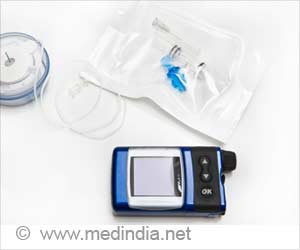A new study has found that aggressively lowering LDL cholesterol and blood pressure can prove beneficial for diabetic patients.
Diabetic patients can benefit is their LDL cholesterol and blood pressure is treated aggressively, a new study has indicated.
Supported by the National Heart, Lung, and Blood Institute (NHLBI) of the National Institutes of Health, the three-year study, titled Stop Atherosclerosis in Native Diabetics Study (SANDS), has shown that aggressively reducing LDL cholesterol and blood pressure can actually reverse hardening of the arteries, or atherosclerosis in middle-aged adults with diabetes.The study of 499 participants is the first to compare two treatment targets for LDL ("bad") cholesterol and systolic blood pressure levels, key risk factors for heart disease, in people with diabetes.
Atherosclerosis is the number one cause of heart disease and can lead to heart attack, stroke, and death.
In the study, almost one-half of the participants (247) were asked to lower to standard levels their LDL cholesterol (to 100 milligrams per deciliter) and blood pressure (systolic blood pressure of 130 mmHg or lower). On the other hand the other half (252) aimed for more aggressive lowering of LDL cholesterol to 70 mg/dL or lower and of systolic blood pressure to 115 mmHg or lower.
The participants of the study were American Indians of age 40 years or above having diabetes, high blood cholesterol, and high blood pressure but no history of heart attack or other evidence of heart disease. All the participants continued to receive their medical care, including diabetes management, dietary and exercise counselling, and smoking cessation, from their health care providers with the Indian Health Service.
"American Indians have a high rate of diabetes and cardiovascular disease related to diabetes, but there are few clinical trials that address these issues in this population. These study results provide needed evidence to help develop community-based programs to treat and prevent the epidemic of cardiovascular disease among American Indians," said Barbara V. Howard, Ph.D., of MedStar Research Institute in Hyattsville, Md., lead author of the study.
Advertisement
The hardening of arteries, a leading effect of high blood pressure and cholesterol and an early sign of cardiovascular disease, was determined by using ultrasound to measure the thickness of the carotid (neck) artery. They also measured the size and function of the left ventricle, the heart's main pumping chamber. Enlarged hearts are known to be predictors of increased risk of heart attack and stroke. These measurements were taken at enrolment, at 18 months, and at 36 months, when the study ended.
Advertisement
Also, researchers said that, compared to baseline, carotid artery thickness increased slightly in the standard group and regressed in the aggressive treatment group, indicating a partial reversal of atherosclerosis. Besides, the heart size decreased from baseline in both groups, the beneficial change was significantly greater among participants in the aggressive treatment group.
"Many patients with diabetes do not reach their blood pressure and cholesterol goal levels and thus remain at high risk for heart attacks and stroke. In our study, participants successfully managed their blood cholesterol and blood pressure to reach their goal levels. Our message to doctors, nurses, and patients is that you can reach your goal levels, and we should work together to help you do that," noted Howard.
The results of this study are published in the recent issue of the Journal of the American Medical Association.
Source-ANI
RAS/L











